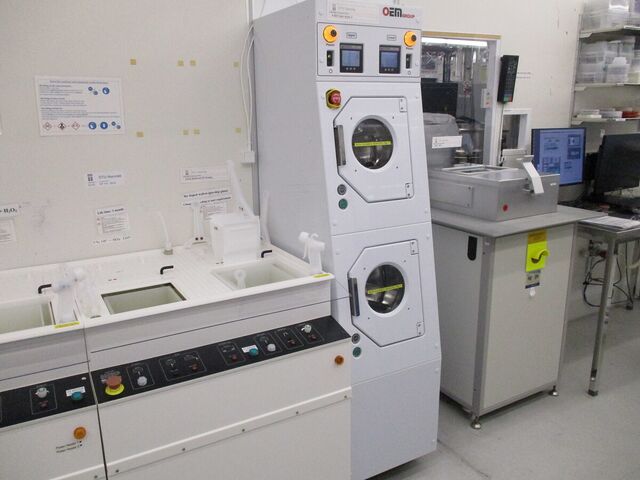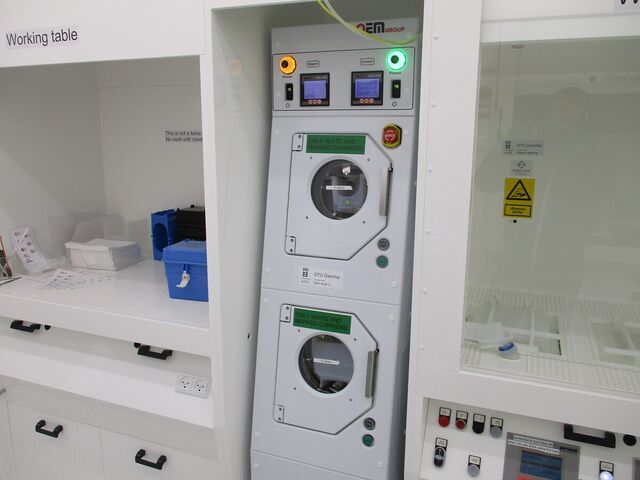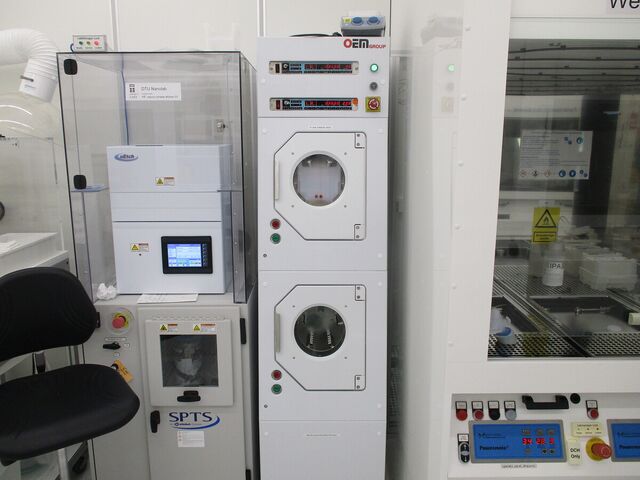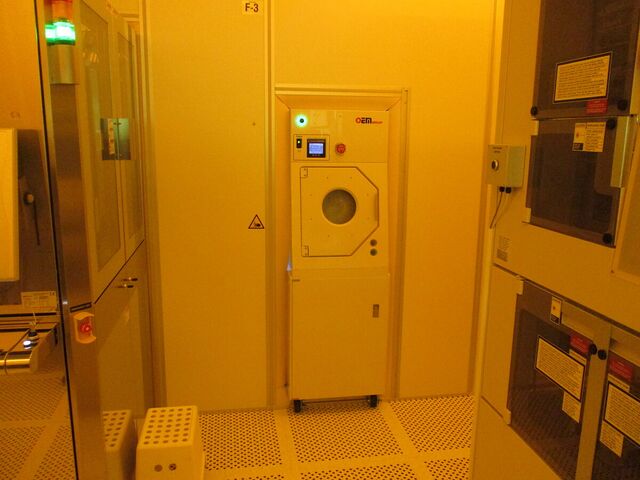Specific Process Knowledge/Wafer and sample drying: Difference between revisions
mNo edit summary |
|||
| (50 intermediate revisions by 9 users not shown) | |||
| Line 1: | Line 1: | ||
{{cc-nanolab}} | |||
'''Feedback to this page''': '''[mailto:labadviser@danchip.dtu.dk?Subject=Feed%20back%20from%20page%20http://labadviser.danchip.dtu.dk/index.php/Specific_Process_Knowledge/Wafer_and_sample_drying click here]''' | '''Feedback to this page''': '''[mailto:labadviser@danchip.dtu.dk?Subject=Feed%20back%20from%20page%20http://labadviser.danchip.dtu.dk/index.php/Specific_Process_Knowledge/Wafer_and_sample_drying click here]''' | ||
=Drying Comparison Table= | =Drying Comparison Table= | ||
| Line 7: | Line 11: | ||
|-style="background:lightgray; color:black" | |-style="background:lightgray; color:black" | ||
!Equipment | !Equipment | ||
|[[Specific_Process_Knowledge/Wafer_and_sample_drying # | |||
|[[Specific_Process_Knowledge/Wafer_and_sample_drying #Spin dryer 2|Spin dryer 2]] | |||
|[[Specific_Process_Knowledge/Wafer_and_sample_drying #Spin | |[[Specific_Process_Knowledge/Wafer_and_sample_drying #Spin dryer 3|Spin dryer 3]] | ||
|[[Specific_Process_Knowledge/Wafer_and_sample_drying #Spin | |[[Specific_Process_Knowledge/Wafer_and_sample_drying #Spin dryer 5|Spin dryer 5]] | ||
|[[Specific_Process_Knowledge/Wafer_and_sample_drying # | |[[Specific_Process_Knowledge/Wafer_and_sample_drying #Spin dryer 6|Spin dryer 6]] | ||
| | |[[Specific_Process_Knowledge/Wafer_and_sample_drying/Critical Point Dryer|Critical point dryer]] | ||
|[[Specific_Process_Knowledge/Wafer_and_sample_drying | |||
|[[Specific_Process_Knowledge/Wafer_and_sample_drying #Nitrogen guns|N<sub>2</sub> guns]] | |[[Specific_Process_Knowledge/Wafer_and_sample_drying #Nitrogen guns|N<sub>2</sub> guns]] | ||
|- | |- | ||
| Line 21: | Line 22: | ||
|-style="background:WhiteSmoke; color:black" | |-style="background:WhiteSmoke; color:black" | ||
!Location | !Location | ||
| | | | ||
*B-1 | *B-1 | ||
| Line 28: | Line 27: | ||
*D-3 | *D-3 | ||
| | | | ||
* | *D-3 | ||
| | | | ||
* | *F-3 | ||
| | | | ||
*D-3 | *D-3 | ||
| | | | ||
*In fumehoods and at chemical benches | *In fumehoods and at chemical benches | ||
| Line 45: | Line 38: | ||
|-style="background:lightgray; color:black" | |-style="background:lightgray; color:black" | ||
!Purpose | !Purpose | ||
| | | | ||
*Drying | *Drying | ||
| Line 53: | Line 44: | ||
| | | | ||
*Drying | *Drying | ||
| | | | ||
*Drying | *Drying | ||
*Rinsing + drying | |||
* | |||
| | | | ||
*Drying sensitive samples. E.g. with cantilevers | *Drying sensitive samples. E.g. with cantilevers | ||
| Line 71: | Line 56: | ||
!Batch size | !Batch size | ||
| | | | ||
*1-25 | *100 mm wafers: 1-25 | ||
*150 mm wafers: 1-25 | |||
| | | | ||
*1-25 | *100 mm wafers: 1-25 | ||
*150 mm wafers: 1-25 | |||
| | | | ||
* | *100 mm wafers: 1-25 | ||
*150 mm wafers: 1-25 | |||
| | | | ||
*1-25 | *100 mm wafers: 1-25 | ||
*150 mm wafers: 1-25 | |||
*200 mm wafers: 1-25 | |||
| | | | ||
*1 to 5 wafers per run. Sizes: 2”, 4" or 6" | *1 to 5 wafers per run. Sizes: 2”, 4" or 6" | ||
* Pieces (up to 10x10mm) | * Pieces (up to 10x10mm) | ||
| | | | ||
*One sample at a time | *One sample at a time | ||
| Line 100: | Line 77: | ||
|-style="background:lightgray; color:black" | |-style="background:lightgray; color:black" | ||
!Allowed materials | !Allowed materials | ||
| | | | ||
*Only for RCA cleaned wafers | *Only for RCA cleaned wafers | ||
| | | | ||
*No restrictions | *No restrictions | ||
| Line 119: | Line 90: | ||
*InAlP, GaAs | *InAlP, GaAs | ||
*SU8 | *SU8 | ||
| | | | ||
*No restriction | *No restriction | ||
| Line 135: | Line 104: | ||
'''The user manual, technical information, and contact information can be found in LabManager: [http://labmanager.danchip.dtu.dk/function.php?module=Machine&view=view&mach= | '''The user manual, technical information, and contact information can be found in LabManager: [http://labmanager.danchip.dtu.dk/function.php?module=Machine&view=view&mach=157 Spin dryer 2] [http://labmanager.danchip.dtu.dk/function.php?module=Machine&view=view&mach=158 Spin dryer 3] [https://labmanager.dtu.dk/function.php?module=Machine&view=view&mach=408 Spin dryer 5] [https://labmanager.dtu.dk/function.php?module=Machine&view=view&mach=323 Spin dryer 6 (8")]''' | ||
== Process information == | == Process information == | ||
Standard process is | Standard process is: | ||
#Rinse (with DI water) for 60 seconds at 500 RPM | |||
#Dry with nitrogen for 150 seconds at 1800 RPM | |||
#Dry with nitrogen and anti-static purge for 30 seconds at 1800 RPM | |||
All spin dryers use the following carriers: | |||
*100 mm wafers: A72-40MB | |||
*150 mm wafers: A182-60MB | |||
*200 mm wafers: A192-80M | |||
<span style="color:red">It is not allowed to use other carriers in the spin dryers, as this may damage the motor due to incorrect mass distribution. It may also cause fragile wafers to break due to excessive vibrations caused by the mass imbalance.</span> | |||
== Spin dryer 2 == | |||
[[File:spinDryer_2.jpg|640px|thumb|right]] | |||
Spin dryer 2 is for RCA processing only, and is located in B-1 next to the RCA bench. | |||
*Top chamber: 100 mm wafers | |||
*Bottom chamber: 150 mm wafers | |||
<br clear="all" /> | <br clear="all" /> | ||
= | == Spin dryer 3 == | ||
[[File:spinDryer_3.jpg|640px|thumb|right]] | |||
Spin dryer 3 is located in D-3 between the working table and wet bench 03. | |||
*Top chamber: 100 mm wafers | |||
*Bottom chamber: 150 mm wafers | |||
<br clear="all" /> | <br clear="all" /> | ||
= | == Spin dryer 5 == | ||
[[ | [[File:spinDryer_4.jpg|640px|thumb|right]] | ||
Spin dryer 5 is located in D-3 between the HF vapor phase etcher and wet bench 07. | |||
*Top chamber: 100 mm wafers | |||
*Bottom chamber: 150 mm wafers | |||
<br clear="all" /> | <br clear="all" /> | ||
= | == Spin dryer 6 == | ||
[[File:spinDryer_5.jpg|640px|thumb|right]] | |||
Spin dryer 6 is located in F-3 Next to the Developer: TMAH stepper. It has a single process chamber that is capable of processing 100 mm, 150 mm and 200 mm wafers. The wafer size is easily changed, by changing the rotor insert frame. | |||
<br clear="all" /><br clear="all" /> | |||
<br clear="all" /> | |||
= Nitrogen guns = | = Nitrogen guns = | ||
Latest revision as of 14:48, 12 February 2025
The content on this page, including all images and pictures, was created by DTU Nanolab staff, unless otherwise stated.
Feedback to this page: click here
Drying Comparison Table
| Equipment | Spin dryer 2 | Spin dryer 3 | Spin dryer 5 | Spin dryer 6 | Critical point dryer | N2 guns |
|---|---|---|---|---|---|---|
| Location |
|
|
|
|
|
|
| Purpose |
|
|
|
|
|
|
| Batch size |
|
|
|
|
|
|
| Allowed materials |
|
|
|
|
|
|
Spin dryers
A tool used for drying wafers. A single cassette of wafers is placed in a stainless steel rotor. The wafers are centered just off the axis of rotation, and rotated at high RPM so that centrifugal force “locks” the wafers in place.
Some of the tools have DI water connected, and can be used for both rinsing and drying of wafers, while other tools do not and can only be used for drying. All wafers have to be washed in a wetbench cleaning station before going into the spin dryer, regardless of using the rinse function or not.
The user manual, technical information, and contact information can be found in LabManager: Spin dryer 2 Spin dryer 3 Spin dryer 5 Spin dryer 6 (8")
Process information
Standard process is:
- Rinse (with DI water) for 60 seconds at 500 RPM
- Dry with nitrogen for 150 seconds at 1800 RPM
- Dry with nitrogen and anti-static purge for 30 seconds at 1800 RPM
All spin dryers use the following carriers:
- 100 mm wafers: A72-40MB
- 150 mm wafers: A182-60MB
- 200 mm wafers: A192-80M
It is not allowed to use other carriers in the spin dryers, as this may damage the motor due to incorrect mass distribution. It may also cause fragile wafers to break due to excessive vibrations caused by the mass imbalance.
Spin dryer 2

Spin dryer 2 is for RCA processing only, and is located in B-1 next to the RCA bench.
- Top chamber: 100 mm wafers
- Bottom chamber: 150 mm wafers
Spin dryer 3

Spin dryer 3 is located in D-3 between the working table and wet bench 03.
- Top chamber: 100 mm wafers
- Bottom chamber: 150 mm wafers
Spin dryer 5

Spin dryer 5 is located in D-3 between the HF vapor phase etcher and wet bench 07.
- Top chamber: 100 mm wafers
- Bottom chamber: 150 mm wafers
Spin dryer 6

Spin dryer 6 is located in F-3 Next to the Developer: TMAH stepper. It has a single process chamber that is capable of processing 100 mm, 150 mm and 200 mm wafers. The wafer size is easily changed, by changing the rotor insert frame.
Nitrogen guns
Nitrogen guns are valuable for drying small substrate pieces or samples that otherwise cannot go into the outer drying tools.
